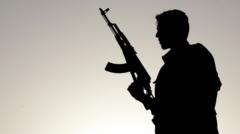As military juntas leverage gold profits amid ongoing insurgencies, the cycle of violence and exploitation deepens across Burkina Faso, Mali, and Niger.
**Gold's Dark Side: How West Africa's 'Blood Gold' Fuels Conflict**

**Gold's Dark Side: How West Africa's 'Blood Gold' Fuels Conflict**
The rise in global gold prices is providing critical funding for conflict in West Africa's Sahel region while increasing suffering among local communities.
In 2025, the gold market witnessed a surge in prices, fueled by economic turbulence and international conflicts. Gold has become an appealing asset for various investors globally, from central banks to retail investors, but many are oblivious to the origins of their gold and the associated conflicts in mining countries.
In the troubled Sahel region of West Africa, where Burkina Faso, Mali, and Niger are struggling with jihadist insurgencies and environmental challenges, gold is perceived as a crucial lifeline for their military governments. With record prices, military juntas like those in Mali and Burkina Faso aspire to reap benefits from the lucrative gold trade. "Because gold prices have been at a historic high… the military governments are hoping that they will be able to benefit directly," stated Beverly Ochieng, a senior researcher at Control Risks.
These three Sahel nations reportedly produce around 230 tonnes of gold annually, valued at approximately $15 billion at current market prices, making them Africa's leading gold producers. However, much of this production is derived from artisanal mining operations, often unregulated and informal, leading to potential underestimation of actual output. Recent developments included Mali's military leader, Gen Assimi Goïta, laying the groundwork for a gold refinery in conjunction with Russian interests, marking a shift in control from Western entities.
Nonetheless, the gold wealth impacts local communities very differently. Artisanal miners struggle to earn a living, with wages stagnating despite soaring gold prices. One anonymous miner revealed, "Prices went up, but the extra profit goes to mine owners… It's risky and uncertain, but for many of us, it's the only option."
Governments in the region divert significant resources towards military operations against jihadist groups tied to al-Qaeda and the Islamic State (IS). This has been supplemented by the involvement of Russian mercenaries, such as the Wagner Group, who allegedly commit human rights violations against civilians. Human rights organization HRW highlights the consequences of state actions alongside insurgent violence, exacerbating the instability of the region.
Dr. Alex Vines of Chatham House points out that the existing conflict over control of gold mining has worsened, with both state and non-state actors vying for dominance in the artisanal mining sector. The ongoing conflict has not only elevated violence but also set militant factions on a path of increased power and financing from the illicit gold trade.
Despite the global demand for ethical sourcing in the gold market, actual enforcement of standards is lacking. The London Bullion Market Association (LBMA) requires compliance with guidelines, but regulation is inconsistent, particularly in refining and trading hubs like the UAE. Limited capabilities hinder effective tracking of gold's origins, with Dr. Vines comparing it to diamonds, which are much easier to trace.
As the complexities of gold trade entangle with local conflicts and global markets, addressing the issues linked to "blood gold" remains a daunting task. The utility of gold for fueling state coffers complicates the path toward resolution. For communities enduring the conflict, it suggests a long road ahead, embroiled in cycles of violence and exploitation amid the clamor for precious gold.
In the troubled Sahel region of West Africa, where Burkina Faso, Mali, and Niger are struggling with jihadist insurgencies and environmental challenges, gold is perceived as a crucial lifeline for their military governments. With record prices, military juntas like those in Mali and Burkina Faso aspire to reap benefits from the lucrative gold trade. "Because gold prices have been at a historic high… the military governments are hoping that they will be able to benefit directly," stated Beverly Ochieng, a senior researcher at Control Risks.
These three Sahel nations reportedly produce around 230 tonnes of gold annually, valued at approximately $15 billion at current market prices, making them Africa's leading gold producers. However, much of this production is derived from artisanal mining operations, often unregulated and informal, leading to potential underestimation of actual output. Recent developments included Mali's military leader, Gen Assimi Goïta, laying the groundwork for a gold refinery in conjunction with Russian interests, marking a shift in control from Western entities.
Nonetheless, the gold wealth impacts local communities very differently. Artisanal miners struggle to earn a living, with wages stagnating despite soaring gold prices. One anonymous miner revealed, "Prices went up, but the extra profit goes to mine owners… It's risky and uncertain, but for many of us, it's the only option."
Governments in the region divert significant resources towards military operations against jihadist groups tied to al-Qaeda and the Islamic State (IS). This has been supplemented by the involvement of Russian mercenaries, such as the Wagner Group, who allegedly commit human rights violations against civilians. Human rights organization HRW highlights the consequences of state actions alongside insurgent violence, exacerbating the instability of the region.
Dr. Alex Vines of Chatham House points out that the existing conflict over control of gold mining has worsened, with both state and non-state actors vying for dominance in the artisanal mining sector. The ongoing conflict has not only elevated violence but also set militant factions on a path of increased power and financing from the illicit gold trade.
Despite the global demand for ethical sourcing in the gold market, actual enforcement of standards is lacking. The London Bullion Market Association (LBMA) requires compliance with guidelines, but regulation is inconsistent, particularly in refining and trading hubs like the UAE. Limited capabilities hinder effective tracking of gold's origins, with Dr. Vines comparing it to diamonds, which are much easier to trace.
As the complexities of gold trade entangle with local conflicts and global markets, addressing the issues linked to "blood gold" remains a daunting task. The utility of gold for fueling state coffers complicates the path toward resolution. For communities enduring the conflict, it suggests a long road ahead, embroiled in cycles of violence and exploitation amid the clamor for precious gold.




















